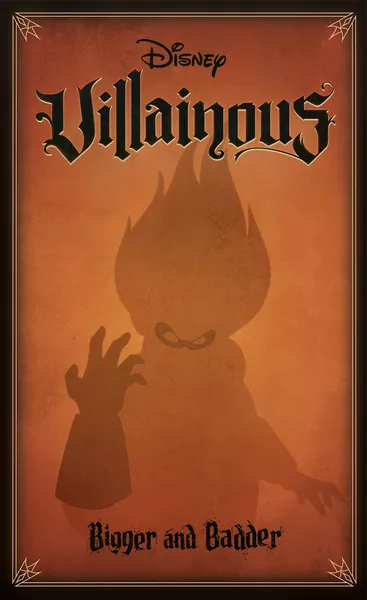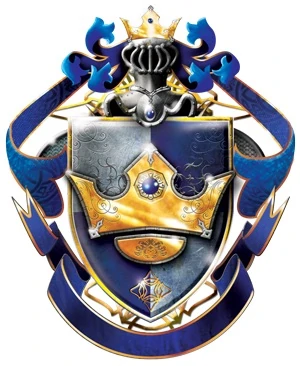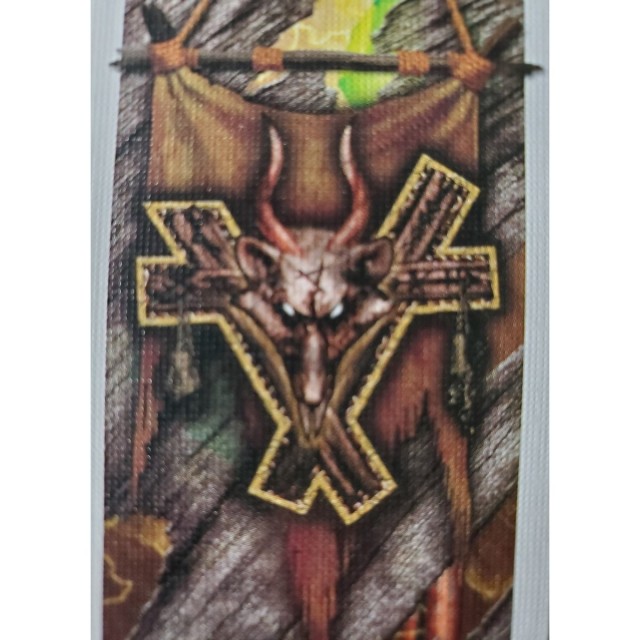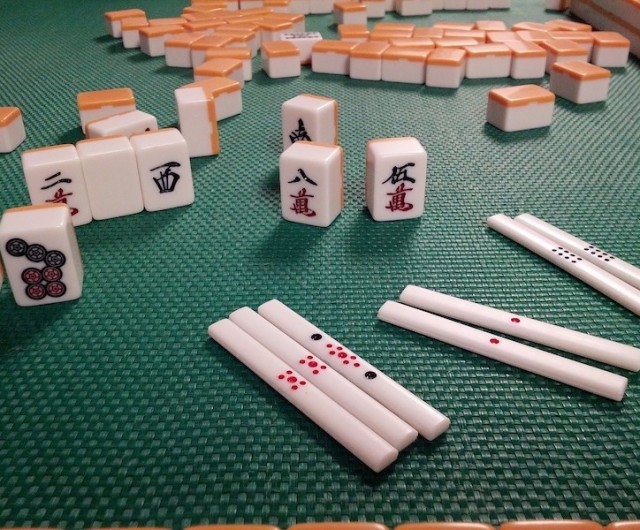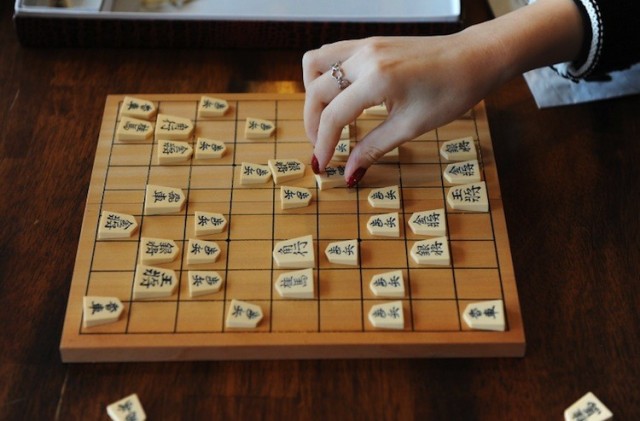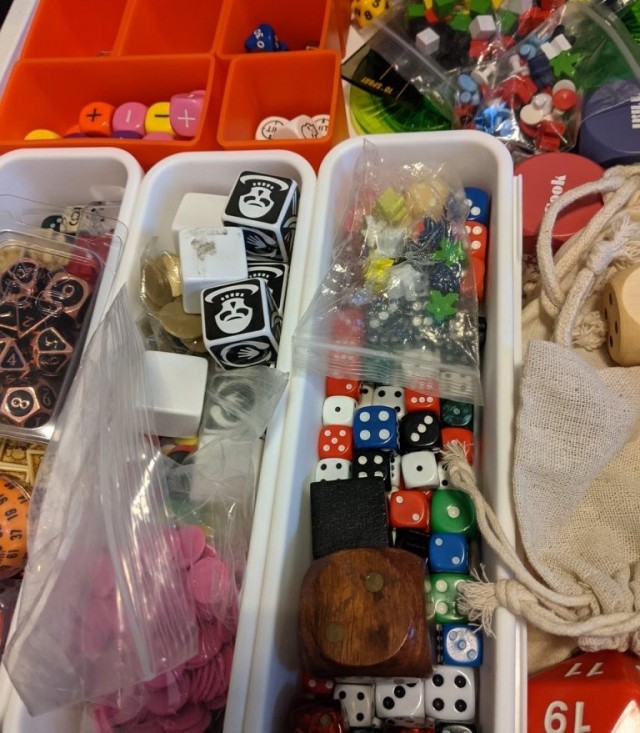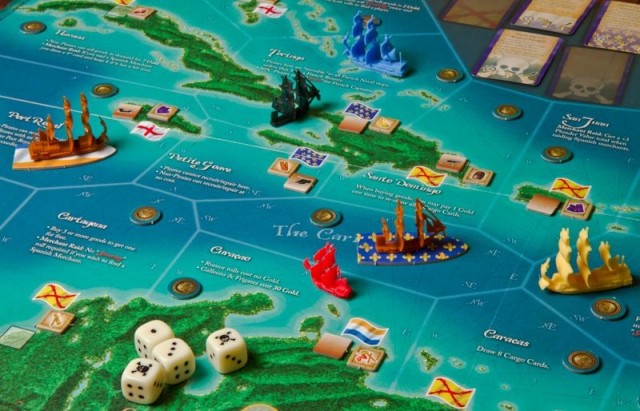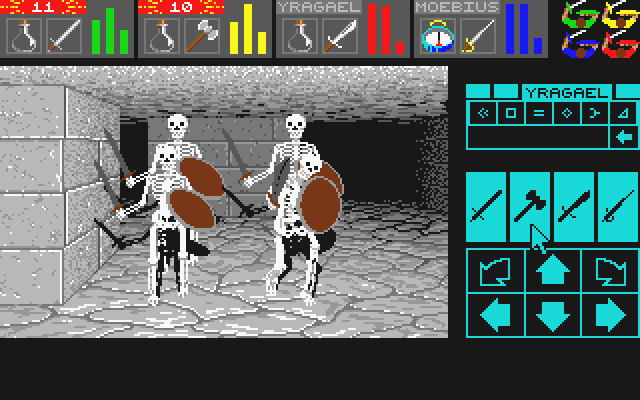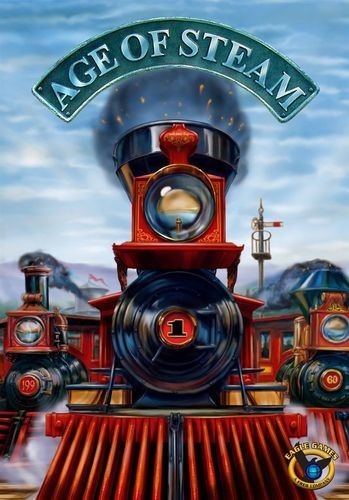In an idle moment over the weekend I thought about all the games that I'd played more than about twenty times. Considering that I keep banging on about the importance of replayability in games the answer surprised me a bit - there were only five, and what's more there's quite a considerable gap between the amount I've played those five and all the other games I own. The games in question were Risk, Space Hulk, Titan, Twilight Struggle and (most shockingly of all) Attika. Curiosly only two of them - Titan and TS - are games I'd rate amongst my absolute favourites although all are good. So I pondered a little more about what it was about those games that had made me rack up quite so many plays and hadn't managed to come up with anything all five shared beyond them being "really good games" when it suddenly struck me. I'd missed one off the list. I hadn't added my most played game of all, a game which I've probably played more times than all the other five put together. That game is Warhammer Fantasy Battle.
The reason I'd missed it off the list was because I'd basically given up the game. Although I still have my rulebooks and several boxes of models and modelling stuff in the attic (including a fully painted Vampire Counts army) I haven't played in over two years and I'm a whole edition of the game behind, whereas I'd played all the other five at least once within that time. I gave up on Warhammer for various reasons, in spite of the fact I'd been playing it since first edition, but mostly I'd got fed up with the scant attention that Games Workshop was giving to the concept of WFB as a game, as opposed to an all-in-one gaming, painting, collecting and modelling hobby. There were ongoing issues with balance in the various army books of sixth edition and even some in the base rulebook. Some had very simple and evident fixes and others had more in-depth fan made solutions that seemed to work but GW simply wasn't interested in taking the time to make these ready-to-go patches "official", and without "official" approval it's difficult to get other players to accept some things that you feel improve the game. I - and others - couldn't understand why GW wasn't more responsive to those of us who viewed Warhammer primarily as a game with the modelling aspect being secondary. The answer that eventually dawned on me was that I was actually in a minority - that most Warhammer players are actually in it for the painting and collecting and the game is just an interesting way of showing off their handiwork. I used to post threads on various WFB forums complaining about this or that aspect of the rules until one day Gav Thorpe, the designer of the current edition of WFB, stopped by and replied to ask why, if I was so interested in Warhammer as a game, I didn't just play board games instead? And this seemed like such a reasonable question that that's exactly what I started to do.
So what is it about Warhammer that kept me interested through all those plays? Why haven't any boardgames - so far - encouraged me to spend time racking up over a hundred plays? Is there anything that designers or discriminating purchases could learn about longevity from this venerable title?
Some of the answers are very straightforward, such as the fact that it's ridiculously easy to find opponents for Warhammer - just walk into any GW shop and you'll find some and there's probably a club in your home town. Compare this to my experiences trying to find a boardgame club where I spent several years frequenting gaming sites before finding out there was one thirty minutes drive away. And of course you only need one more person to play a game against, rather than a group, which adds even more to the ease of getting a game. However obvious this might seem, it's importance can't be overstated - one of the reasons I got back into playing Warhammer after sitting out the fith edition was because I got fed up trying to find people to play RPGs or Magic: the Gathering against while there seemed to be GW gamers coming out of the woodwork. So, a salutory lesson here but not one that boardgamers can learn much from.
The number of Warhammer players around the world isn't just a function of slick GW marketing and a shop in every big town - it's as much to do with the venerable age of the product. It's had over twenty years on the gaming market and in that time has seeped into the collective concioucesness of the gaming community in a way that short-lived boardgames have never managed. And over that time it's built up a depth of theme that's truly astonishing to behold and which is as good as - if not better - than many RPG campaigns. This obviously has lots of appeal to theme-loving gamers such as ourselves. Depth of theme - as opposed to well-applied or well-integrated theme - isn't something that most board games bother with. If you want evidence just look at the relatively small crossover between RPG brands and boardgaming equivalents even though the crossover in the market is fairly large. Even where they do exist - the various D&D games like Dungeon for example - the depth of theme available is usually ignored. Same goes for a lot of boardgames based on film or literary franchises. Why is this? Well in the modern boardgaming hobby part of the answer is no doubt that communicating depth of theme usually requires a depth of rules. Amongst the few boardgaming examples of deep theme, the Glorantha games Dragon Pass and Nomad Gods, illustrate the problem with their pages and pages of "exotic" units and accompanying rules and notes. Unless you have a theme which is already so familiar to the players that it's second nature to them then to communicating it through a game is hard work. Look at another successful deep-theme example, War of the Ring. It's complex already, so thankfully the designers didn't need to spend time and space trying to communicate why the fellowship picks up corruption moving through the Mines of Moria because most geeks will work that out the second they read the rule. The same is true of Warhammer - it's in the blood of a lot of gamers, partly because it's been around for so long and has become such a well-known fixture on the gaming landscape and partly because it's cleverly been constructed by borrowing bits of other fantasy settings and blending them into something new. There's D&D in there, and Glorantha too, and Elric, and a big fat dollop of traditional myth and legend and a good deal more too. The result is that Warhammer has a theme so deep it can satisfy parts that other themes cannot reach.
Perhaps the most obvious thing about Warhammer as far as it's longevity goes over boargames is the variety of stuff on offer. One could liken the base rules set to a basic board game and the WFB army books to board game expansions but this would be misleading. For the most part, expansions for board games don't make any great changes to the basic premise of the game. Expansions also tend to affect all the players in a board game equally. By comparison each army book represents a sea change in the way you play the game - although the core rules remain the same all the book introduce specific things about the army in questions which break and change the basic rules in a variety of ways from the subtle to the outrageous. And because it's common for each player at the table to come with a different army, the twelve-odd army books don't act like twelve different expansions becuase each combination represents a variety of different situations that might arise or tactics to explore. It's more like having a game with a hundred and twenty different expansions, many of which are owned by your friends so you don't need to buy them. This gives WFB and absolutely staggering amount of variability for the players to explore. It also represents a big weight of rules to digest to be sure, but here's another part of the appeal - because the release of the books with each edition is staggered, you can learn them piecemeal. If you don't play on the tournament circuit then you don't need to learn all of them anyway. An expansion model like this in board games isn't commonly seen - the only example I can think of is Columbia games' Wizard Kings - and on reflection it's not hard to see why. Boardgamers thrive on the fact that they can have a number of games in their collection which are completely different, not just variations - however diverse - on a single theme. However, I think the lesson to be taken away here is the one about the way that expansions which offer asymmetric setups are inherently longer-lived than ones which affect all the players equally because the asymmetric options combine to create lots more potenital variability. If you're going to work asymmetry into your games then make it run deep in the game system and give the players a lot of potential setup variable - like Twilight Imperium 3 for instance - than have a limited number of options that are only skin deep - like in Return of the Heroes.
Another thing about the potential variety of Warhammer - and indeed most miniatures games - which is often overlooked by boardgamers is the multitude of situations which can arise from the fact that movement is completely open. You deploy and move your pieces according to the rules but they can end up in any position on the table which creates a staggering amount of tactics to explore. If that were not enough, the lack of delimited areas means you can play visual guessing games as WFB does with charge distance and artillery ranges. In contrast nearly all boardgames define very strictly the areas of the board which can contain your playing pieces and how you can move between them. Even games with modular boards have this feature and the variety offered by a modular board can't compete with the variety offered by an open table across which you can scatter terrain at your whim. I suppose that in a way this limited movement and deployment aspect is what makes a boardgame a boardgame, but there are exceptions. Look at Wings of War for instance in which cards and fixed-size templates unite to create the same effect at a much smaller cost in space and money. Or perhaps combine the two into a semi-open situation where units can move to multiple positions within a space, a little like the very novel wargame Bonaparte at Marengo. In short this seems like a big part of the potential longevity of a miniatures game and rife territory for a boardgame designer to explore.
In spite of the fact that WFB has been around for over two decades and seven editions, the basic mechanics of the game remain unchanged. Combat is resolved by throwing a dice for each model to see if it hits, then for each hit another dice is thrown to see if it wounds, then yet another dice to see if the wound penetrate the targets' armour. The side which takes the most casualties (usually) then throws two dice against a leadership score to see if they run away. Other systems - magic, maneuver, artillery - have changed significantly over the years but the basic rules haven't. And the reason they haven't is because, just as in perennial classics such as Risk, the rules simply work. The amount of dice thrown around tends to even out grotesque imbalances in luck, there's plenty of excitement with all that rolling, there's thrills and skill in the visual range-guessing games and strategy in maneuver and matching up the strengths and weaknesses of your units against those of your opponent. So what the WFB designers have done with each new edition is stuck with the bits that were good from the last edition, and tinkered with the bits that weren't so good. Contrast this with what tends to happen in boardgame design - although the comparison isn't perfect because boardgame designers tend to create new games rather than build through different editions of one game, there's much more of a knee-jerk reaction to things that aren't popular. If a game gets criticised because of some poor mechanic or other, people tend to throw away the game as an entire entity, rather than keep the good bits and build on it. Witness what can be done when you change that attitude - Martin Wallace is a past master at it and has created a number of innovative and well-recieved games as a result, and the recent reneissance in Risk titles, started with 2210 and now come round to Black Ops is another example. For a while it was fashionable to mindlessly bash the risk mechanics as oh-so-random but the interst Black Ops has aroused has demonstrated that it was actually the supporting mechanics in world-domination Risk which were at fault, not the dice.
So where does this leave Warhammer? In retrospect this piece probably sounds like an apology for the game, which it was never intended to be. It's not something I would go back to in it's present form as the balance issues and lack of interest from GW in their product as a game rather than a wider hobby still seem to be present in the latest edition. Perhaps it will always be thus - as I already said, most Warhammer gamers like the wider hobby aspect and even part-balancing something with so many different variables in the asymmetry is nigh-on impossible (not to mention the commercial aspects of making your newest releases more powerful than the last lot ...). Besides, I've come to really love the dynamics of a group around the table. And in reality, now I have a family I don't have time for modelling and I value the fact I can just pull a game off the shelf and play rather than investing lots and lots of time in what is effectively preparing for the game. But when, or if, these things change I could be persuaded to give it another go - it's hard to completely put away something that's been in your life for twenty years. And in the meantime, I just hope that some designers out there get enthused by some of the ideas I've kicked up in this article.
 Games
Games How to resolve AdBlock issue?
How to resolve AdBlock issue? 
